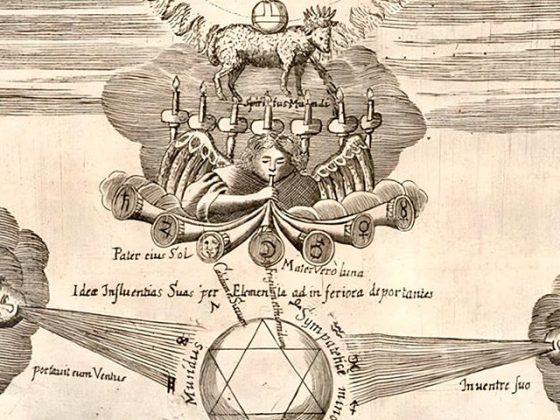1. First of all, we must know who we are, where we come from, where we are going, what is the purpose of our existence, why we exist, what we exist for.
To work in order to eat is undoubtedly necessary, but that is not everything. With what objective do we have to eat? We need to eat in order to live but, why do we have to live? What is the purpose?
Living for living’s sake, without knowing why we must live, seems quite absurd. We need to know the reason for our existence, why we are in this world, for what we are in this world.
If we observe a person, it does not mean that we know him. We need to know him.
The physical body is made up of organs, the organs of cells, the cells of molecules, the molecules of atoms. If we split an atom, we free energy; that is obvious. So, in final synthesis, the physical body comes down to different types and sub-types of energy.
What exists beyond the physical body? Is there anything? Or are we only a heap of flesh, blood and bones? Impossible! We are something different, or we have something different, but what could that be?
2. Many psychology books have been written about willpower, but what willpower are they referring to? We must not forget that inside of us there are thousands of wills, that each one of the Red Demons of Seth has its own will, then what?
Within us, wills collide with wills, and many minds with the minds. Within us, we live in eternal conflict, we are full of terrible contradictions. If we could see ourselves in a full-length mirror, just as we are, we would run away terrified.
We are full of frightful contradictions. The “I”, for example, of the intellectual center says in a given moment: “I will study a book”. Suddenly, the “I” of the center of movement comes and exclaims: “No! Open a book at this hour? No, better take a walk somewhere, on a bike”. But suddenly, when the individual is preparing take the bike, another “I” appears, that of the stomach, and says: “No, no, no, I am going to eat; first eat, then comes the rest”.
That is to say, we are full of terrible contradictions. We suddenly say to the beloved woman: “I adore you, my life, I would give my life for you, my darling…”. Then, later on, we say the same thing to another woman. So what are we doing? The woman has a great bearing which confuses the adorer; hours later it may happen that she is also smiling to another suitor, then what? What terrible contradictions! Sometimes we give our word in a business, and suddenly, we take it back: “no, my mother said definitely no”.
We do not have continuity of purposes, my esteemed friends. For a while we think one thing, and another while, another thing. We check the newspaper to know what movie will be played, and we even prepare to go to the movie and to the cinema, but then someone tells us that things are better in another cinema, so we no longer go where we were about to go, but we take the car and go to somewhere else. A sick person comes to a doctor and says: “Doctor, I have a strong pain here, next to the heart, but it kind of doesn’t hurt…, the liver hurts, but it kind of doesn’t hurt…, I have a pain here, but sometimes it’s like I feel it over here…”. Then the doctor replies: “Take this remedy, and kind of not take it…”.
We are all like this, my dear friends, full of frightful contradictions, we do not have a continuity of purposes. We start by studying engineering at university. How joyful we go to the first classes with the little book in hand! “We are engineering students” –we say–, and a while later “but no, I’d better become a doctor”; and we then join the Medicine Faculty and very judiciously we start to study medicine. One day, we come home and tell mom and dad: “No, I am no good as a doctor, that thing of doing autopsies on corpses is nothing pleasant, and the worst thing is that I had to eat upon the stomach of a dead person”.
In conclusion, my dear friends: not doctors either, and this way, we end up somewhere as employees in some small office if we are lucky, or behind the counter of some humble store.
What terrible contradictions we have, my dear friends, all due to the lack of continuity of purposes. But what are the terrible contradictions due to? Simply, due to the multiplicity of “I’s” that we have within. Inside of us, there are “I”-doctors, “I”-engineers, “I”-lawyers, “I”-merchants and even witch apprentices. What types of “I’s” dwell in us? We have a type of traveling zoo. What I am saying is not pleasant at all, right? But that’s how it is!
3. Unfortunately, people easily admit that they have a physical body, but it is hard for them to comprehend their own psychology, to accept it in a crude and real way. They accept that they have the physical body because they can see it, touch it, feel it. But the psychology is a little distinct, a little different. Certainly, as they cannot see their own psyche, as they cannot touch it, feel it, for them it is something vague that they do not understand.
When some person starts to observe himself, it is an unmistakable sign that he has the intention to change. When someone observes himself, watches himself, this indicates to us that he is becoming different from the rest.
In the diverse circumstances of life, we can self-discover. It is from the different events of existence that we can take the psychic material necessary for the awakening of the Consciousness. In relation to the persons, either at home, or on the street, in the countryside, at school, in the factory, etc., the defects that we carry hidden, surface spontaneously, and if we are alert and vigilant like the sentry in times of war, then we see them. The discovered defect must be entirely comprehended in all the levels of the mind.
4. In revolutionary psychology, the necessity of a radical transformation becomes clear, and this is possible only by declaring to ourselves a war to the death, merciless and cruel. As there is no true individuality in us, it becomes impossible for the continuity of purposes to exist. What one certain “I” asserts at one moment cannot pose any seriousness due to the concrete fact that any “I” can assert exactly the opposite at any moment. The most serious thing is that there are people who emphatically assert that they are always the same. The individual in himself is nothing more than a machine who serves as a vehicle for one “I” as readily as he serves as vehicle for another “I”.
5. There are people who are polite to others, who are decent. There are people who offer their friendship to others. That is the public or exoteric aspect –we would say– but that is not everything. Knowing that we have an inner psychology, it is not enough to merely know how to behave decently with other people, the fragrance of friendship alone is not enough from the external point of view.
What is the behavior that we have internally with other people? Normally, those who offer friendship to another person have two facets: the external and the internal. The external one is apparently magnificent, but the internal one, who knows?
Are we sure that we do not criticize the friend to whom we have paid so much appreciation? Are we sure that we do not feel any antipathy toward some of his facets? Are we sure that we are not taking him to that cave that we have in the mind in order to torture him, to ridicule him while we are sweetly smiling at him?
How many people who appreciate someone, do not cease to criticize in their interior that someone that they appreciate, even if they do not exteriorize their critics, and ridicule their best friends, even if they smile sweetly in their presence.
In reality, we must be more complete, more integral. Let’s try for a moment to synchronize two watches: the external one and the internal one, the exterior one and the psychological one; so that they function in perfect harmony with one another. Because it is useless for us to be well-behaved with our friends, to offer them our affection, if on the inside we are ridiculing them, if on the inside we are criticizing them, if on the inside we are torturing them. It is better for the two watches –the exterior and the interior– to function in unisonous, second by second, from moment to moment.
We must be more complete, more integral; stop the scathing inner psychological criticism toward people that we appreciate. How is this contradiction possible, to appreciate a person and internally to be criticizing him, to speak well of this person whom we appreciate, but on the inside, to be eating him alive?
Now, you must know very well that within each one of us live a lot of people, all the “I’s”. When one grabs a hold of one of those “I’s” and studies it with the sense of psychological self-observation, he can prove that it has the intellectual center, the emotional center and the motor-instinctive-sexual center, that is to say, that it possesses the three brains. Any “I” has a bottled-up mind, has a bottled-up will, is a complete person. So, many persons exist within us, within each person live many persons: the psychic aggregates.
So, any friendship that we have deserves to be treated properly. You have a friend: there are things about the friend that you like, and there are things that you do not like. You are friends with a certain “I” of your friend or with a few “I’s” of your friend. But there are other “I’s” of your friend that bother you, that cause you antipathy, because we have to take into account that within each person there are many persons that manifest themselves. You tend to be friends with certain aggregates of this or that friend, of this or that person, but you are not friends with all the aggregates of the friend in question.
That is why we say: “There are things about this friend that I like and there are things that I dislike; he has good things and bad things.” This is the way we have to speak; yes, it depends on the type of aggregate that is speaking at a given moment.
Then the friendship that we feel for others is not complete. We only feel friendship for a few aggregates of that person, but we do not feel affection for the other aggregates of that person.
It can happen that the physical-psychological person that we appreciate, has psychological aggregates that we do not appreciate, and at certain moments that person is a nuisance to us precisely because there are other aggregates expressing themselves with which we have no friendship. That is the harsh reality of the facts!
If we had a permanent “I”, we would say: “I am friends with so-and-so in a total and complete way.” We would not look for “buts” nor flaws of any kind. But it turns out that there is no permanent “I”, but many. So, which of those aggregates, or which of those “I’s” of that individual do we appreciate? It’s not all of them! That is why we need to be understanding in this matter interrelation.
6. When a couple gets married, they should understand psychology better. Commonly, one of them starts hurting the other; the other reacts and also causes pain, a conflict is created. Finally, the conflict passes, the two reconcile and everything continues in peace apparently; but there is no such thing, the resentment remains.
Another day, there is another conflict, husband and wife argue over some stupidity –maybe jealousy, in short, anything–. The result: the conflict passes and another resentment remains, and like this, conflict by conflict, the resentments increase and the honeymoon ends. Finally, there is no honeymoon anymore, it ended; what exists are the resentments on both sides, and if they do not get divorced, if they continue together, they do so out of duty or simply out of animal passion and that is all. Many matrimonies no longer have anything to do with love. Love nowadays smells of gasoline, of celluloid, of bank accounts and resentments.
The most serious mistake that a man and a woman can make is to end with the honeymoon. This could be preserved with the condition of knowing how to preserve it…
7. Psychologists tell us about the psychological “I”, the “I” of psychology, of experimental psychology, etc., but we move forward with a more profound psychology, with a revolutionary, rebellious psychology. We know, in fact, that there are colossal powers inside of us, but we need these powers to express through us, and this is not achieved. What is going on? It is indispensable, the time has come for us to discover the cause of our pain…
8. Pain is the result of our own mistakes. When someone commits a mistake, pain is the fruit of it. We make mistakes because we are imperfect; we are imperfect because we have the “I” within. When the “I” disappears, authentic and true happiness comes to us.
Samael Aun Weor








